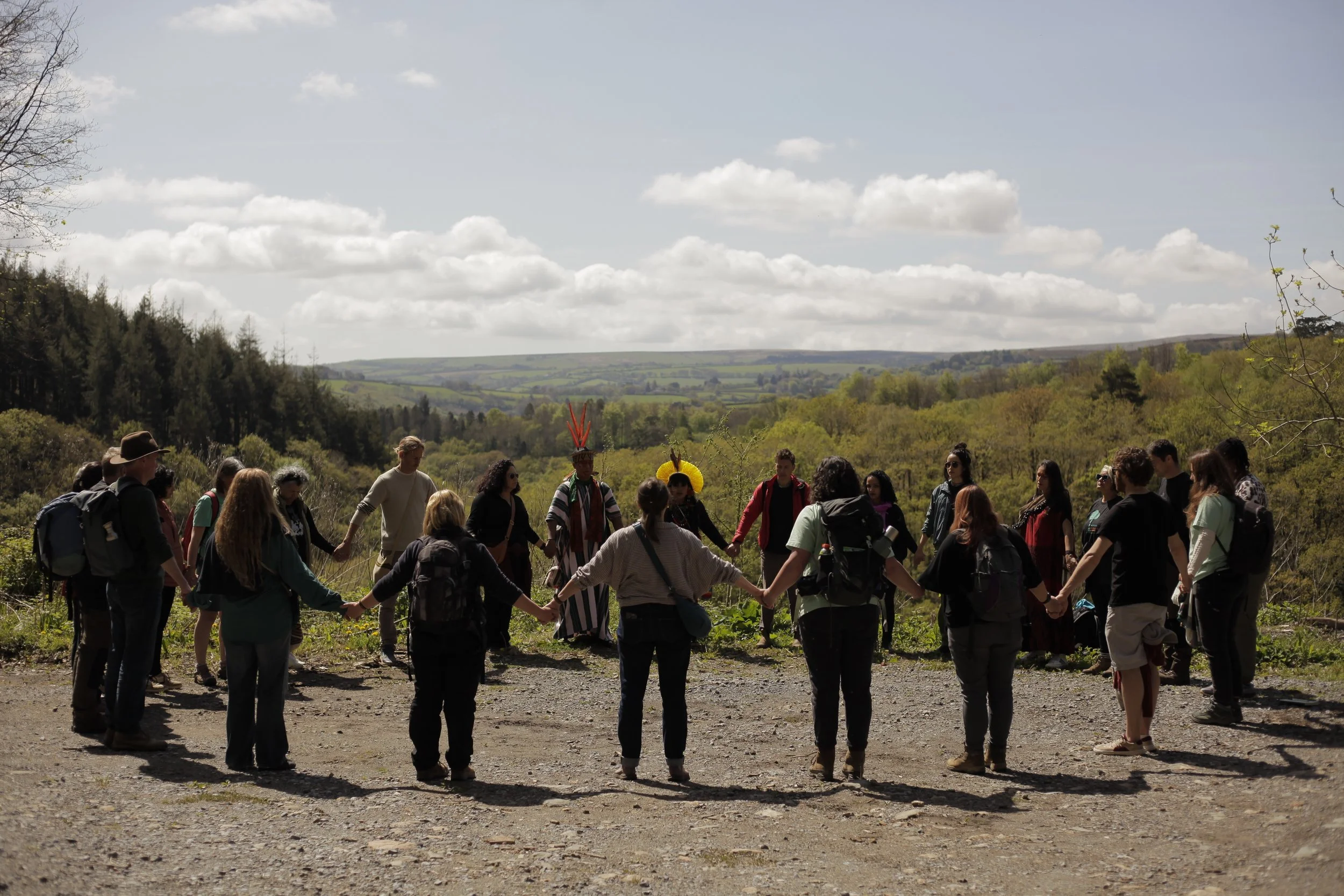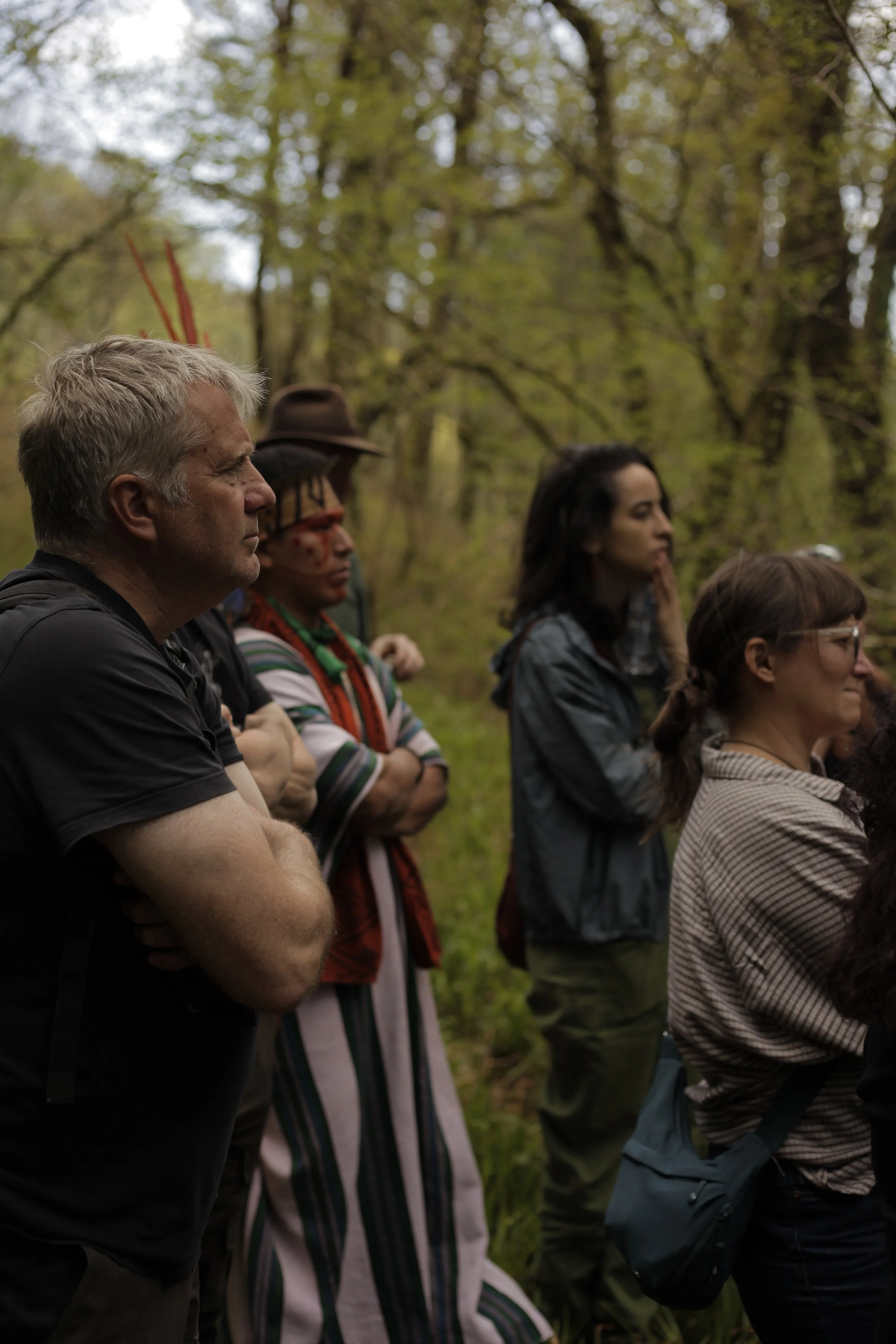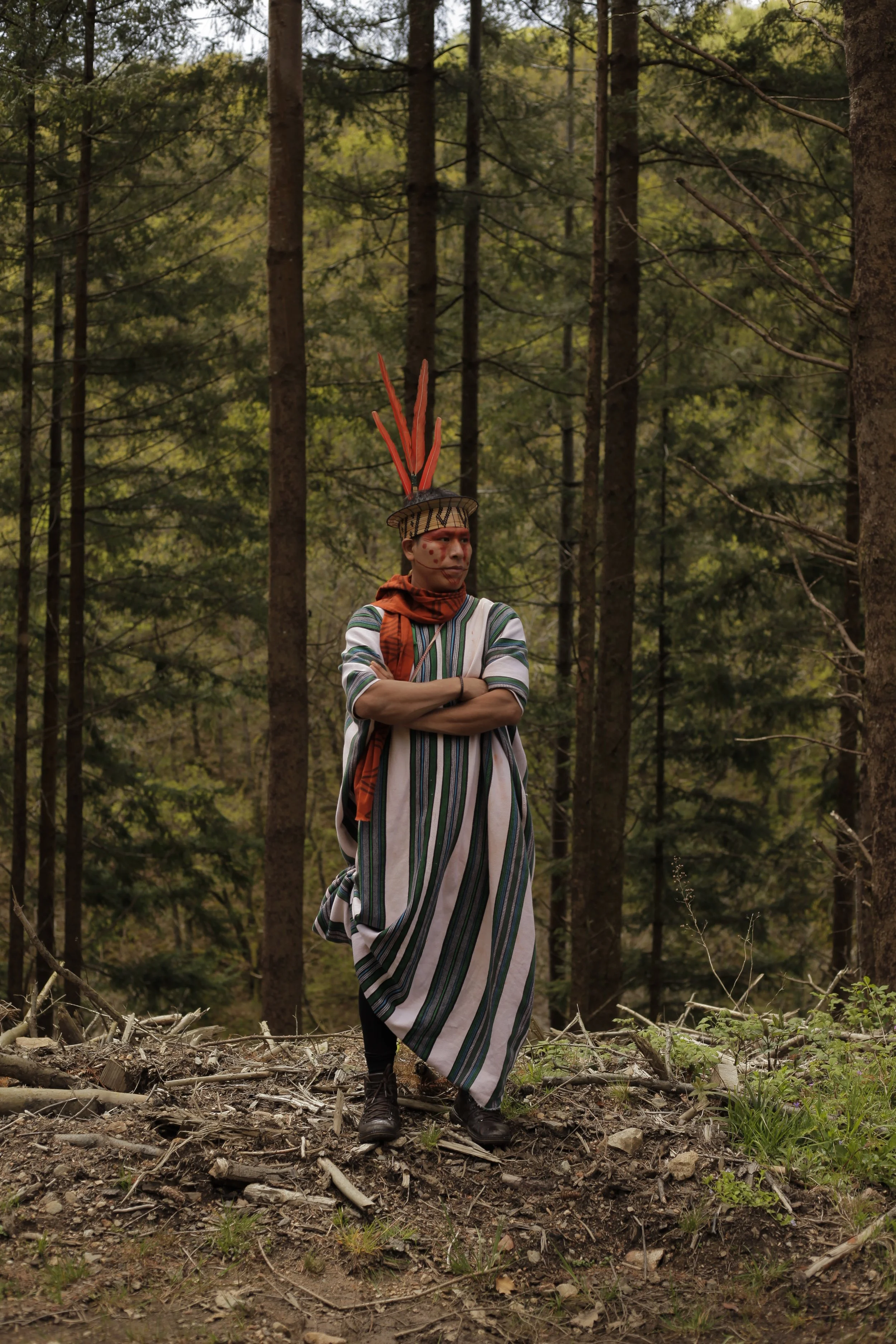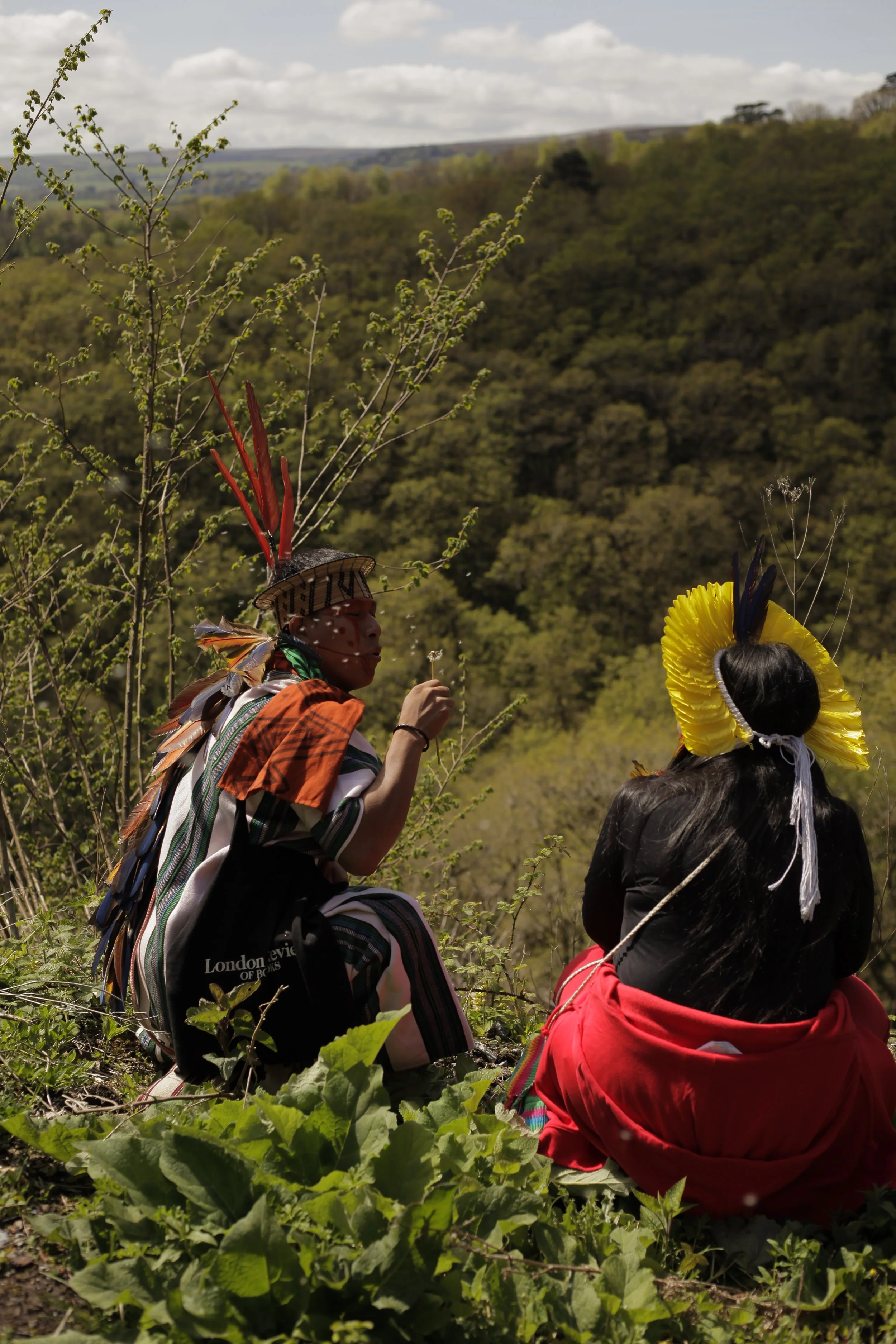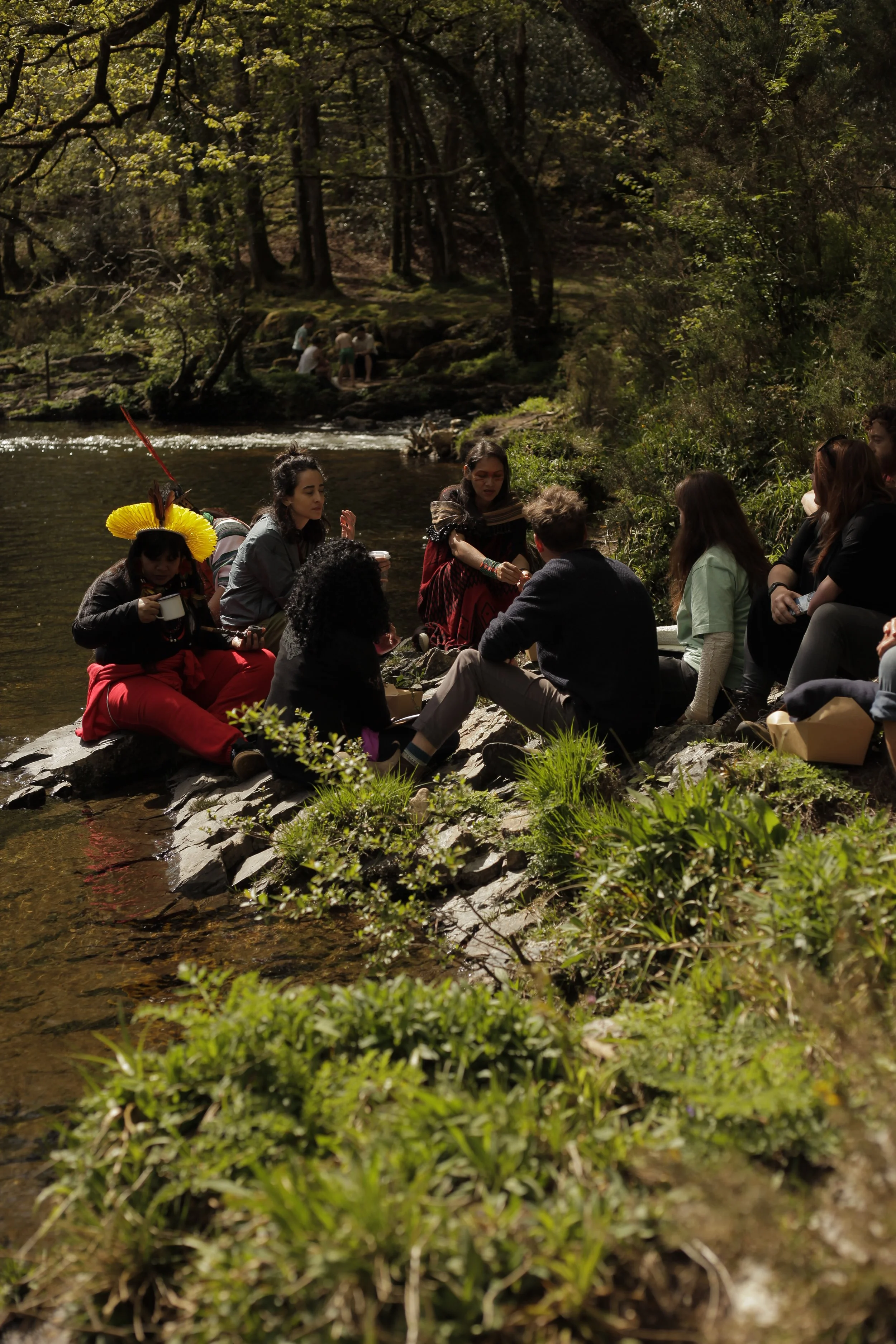Rainforest Echoes: From the Amazon to Dartmoor
Written by: Alejandra Hart
Staff members from the Woodland Trust, joined by members of NGOs and indigenous groups from the Amazon Rainforest, joining in a prayer conducted by Ju Kerexu of the Guarani people. Credit: Lee Magpie Photography
In late April, a small group of us gathered in a quiet rainforest site. Not the dense, steamy canopy of the Amazon, but the moss-laced, lichen-draped edges of Dartmoor. Tucked into a valley by the River Dart, Buckland Wood is part of a long-term effort to restore temperate rainforest, a rare habitat that once stretched along the western edges of Britain, shaped by mild Atlantic winds, rain, and time. It was here, that members of the Asháninka and Guarani, and multiple NGOs including Comite Chico Mendes and Instituo Ze Claudio e Maria, walked with us, Woodland Trust staff, conservationists and storytellers from the South West of England; sharing silence, stories, and questions that linger long after footsteps fade.
We stood in a fragile, recovering temperate rainforest, one of the UK’s rarest and most overlooked habitats, and spoke about what it means to restore not just trees, but relationships with place, with ancestry, with the more-than-human world. The meeting began with a blessing. Ju Kerexu, Guarani spiritual leader, stood at the edge of the forest and offered words in her language, words for the spirits, asking permission to enter. It was an act that spoke to a way of being where land is alive, and the relationship with nature shares an offering, a moment of reciprocity.
David Rickwood, site manager of Buckland Wood, listening to the thought-provoking discussions of the day. Credit: Lee Magpie Photography
As we walked, we shared the challenges our forests face: in the Amazon, rampant deforestation, criminal exploitation, and dispossession; here in the South West of England, centuries of fragmentation, overgrazing, and disconnection. The Dartmoor rainforest we walked through bore witness to both loss and possibility: trees hundreds of years old alongside newly planted saplings, a fractured ecosystem still echoing with resilience. Among the oaks and rowan, beneath birdsong and the soft rustle of lichens, we spoke of memory and hope.
In the Amazon, they say the trees speak. On Dartmoor, it felt as if they were listening.
Okosho of the Asháninka people stands amongst connifer trees on Buckland Wood, Dartmoor. Credit: Lee Magpie Photography
Ju Kerexu of the Guarani people spoke of how every forest has guardians. “Whenever we go into the woods,” she said gently, “we ask for permission, so they do not feel invaded. We give, and we take, but always with awareness.” These words reminded us that restoration is not simply an act of planting or planning, but a reconnection to something forgotten but not lost. What was striking, and deeply humbling, was the way Alexandrina Piyãko, a spiritual leader from the Asháninka, and Ju Kerexu asked us questions we had long forgotten how to ask ourselves. Who are the Indigenous peoples of this land? What happened to them? Where are your roots?
It is painful to acknowledge how thoroughly the old lineages here have been severed. By enclosure, by Empire, by the Industrial Revolution, by forgetting itself. We stood in that forest not just as ecologists and conservationists, but as descendants of people who once knew how to live in reciprocal relationship with land, and who, over time, were taught to see it as property rather than kin. There is grief in that, a grief that is quiet but constant. Yet in speaking it aloud with those who have carried their cultures through centuries of conflict, we found solidarity.
The leaders from the Amazon listened closely to what we are doing: restoring native temperate rainforests by working with landowners and farmers, by reintroducing biodiversity, by letting rivers breathe again and deadwood fall, by letting nature regenerate itself. They wanted to know, “is it just the Woodland Trust doing this? What about the schools, the artists, the communities?” Where is the heart of this movement? We told them about our partnerships, such as the South West Rainforest Alliance, and our work with artists, storytellers, and educators to rewild not just landscapes but minds. It was clear to all of us: without cultural repair, ecological restoration is shallow. The two must move together, or not at all.
Okosho of the Asháninka people blows dandelion seeds at Ju Kerexu of the Guarani people in a temperate rainforest site on Dartmoor. Credit: Lee Magpie Photography
Later that day, by the side of the River Dart, we paused to listen; not just to each other, but to the wind, the trees, the water. “When we leave,” Alexandrina said, “we bring our ancestors with us. I am not here alone.” She told us how disorienting it was to be so far from her rainforest, but also how right it felt to be here. “You don’t need to come to the Amazon,” she said, “You can plant seeds from here. Whatever is done here helps us all.”
To plant seeds is to live in hope. But more than that, it is to believe in continuity. To plant for a future we will not see is a political act, a spiritual act, and a cultural act. These rainforests, in the Amazon or Dartmoor, vast or small, teach us that regeneration takes time, community and stories. Always stories. Because it is stories that hold us together across time and space, that remind us why we care, that pass on the seeds of hope to those who come after.
“We must see ourselves as a tree. We may cut our leaves; we may cut our branches but will never be able to cut our roots.”
And so, we left the forest changed. Not with answers, but with deeper questions. This gathering was a powerful reminder that healing the land also means healing ourselves and mending our relationship with nature. That the rainforest, whether tropical or temperate, is not just a place, but a practice: of remembering, of relating, of returning.
What if, in every forest, we asked for permission to enter? What if, every act of planting was also an act of reweaving, of apology, of gratitude? What if, as Alexandrina told us, we brought our ancestors with us and thought not just of our own lifetimes, but of the many lives yet to come?
Perhaps then, the forests will speak again.
Staff members from the Woodland Trust, joined by members of NGOs and indigenous groups from the Amazon Rainforest, listen to the words of Alaxandrina Piyãko of the Asháninka and Ju Kerexu, of the Guarani, by the reiver in a Temperate Rainforest site on Dartmoor. Credit: Lee Magpie Photography
We need to raise £2.8 million to cover the purchase costs and fund the restoration Buckland Wood desperately needs. If you would like to contribute to the appeal, please use this link - Buckland Wood appeal - Woodland Trust.
We invite you to listen carefully, plant thoughtfully, and reconnect locally. Learn more about the temperate rainforest recovery project by joining our events and keeping up to date with our news page!
Thank you to Alexandrina Piyãko, Okosho, Ju Kerexu, and the representatives from the Asháninka and Guarani peoples, as well as Comite Chico Mendes, Instituto Ze Claudio e Maria, the Woodland Trust, the South West Rainforest Alliance, and all who joined us at Buckland Wood to listen, reflect, and reimagine the restoration of temperate rainforests in the UK.
Rainforest Recovery is the South West strand of The Rainforest Restoration Project. It is being led by the Woodland Trust in partnership with Plantlife. This project is funded as part of the Government's Species Survival Fund. The fund was developed by Defra and its Arm's-Length Bodies. It is being delivered on behalf of Defra by The National Lottery Heritage Fund.

